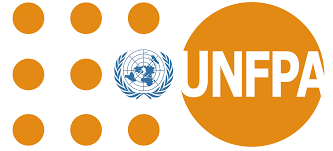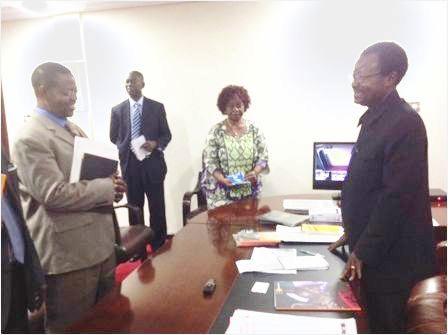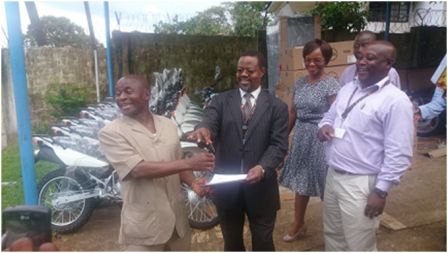Young Farmers trained on safer sex and reproductive health behaviour
The United Nations Population Fund (UNFPA) has the mandate of strengthening the knowledge and capacity of adolescents and young women and men who suffer from difficulties in accessing Sexual and Reproductive Health information and services. Young farmers that are currently undergoing one month training at the United Nations Food and Agricultural Project site at Newton were considered as target group. The UNFPA in collaboration with other partners like National AIDS Secretariat, United Nations Food and Agriculture Organization, Ministry of Health and Sanitation etc, held one-day training for the young farmers on Friday 30th November 2012 at the Sierra Leone Agric-Business Initiative (SABI) Center at Newton. (Photo: Alhassan Kamara of UNFPA and Madam Octavia Johnson of Marie Stopes)
The objective of the training was to enable beneficiaries of the FAO project gain access to quality gender-sensitive youth-friendly reproductive health information and have a better knowledge on the benefits of engaging in safer sexual behavior. Topics covered during the training include: sexual and reproductive health and rights – general information; family planning, other sexual and reproductive health services, gender-based violence, and HIV and AIDS.
Alhassan Kamara is UNFPA’s Programme Analyst, Adolescent Sexual Reproductive Health. He admonished participants to share knowledge gained in their localities so as to effect the necessary changes in misconceptions on reproductive health, safer sex and other health related issues. He admonished them to take family planning issue with all seriousness for a better family living and life-saving at all times.
Miss Nyaibor Ngombu is UNFPA’s Program Analyst on HIV and AIDS. She reiterated the fact that farmers key players in channeling information on reproductive health and safe sex in their localities. She urged participants to demonstrate their commitment in ensuring that the lives of their families are prolonged, and added that the young farmers must serve as examples in family planning.
The Western Area HIV and AIDS Regional Supervisor of the National AIDS Control Program in the Ministry of Health informed the gathering that 87% of HIV transmission is through sex. Joshua BM Sesay encouraged young farmers to take advantage of the HIV test in order to know their status. “Knowing your status will help prolong your life and also contribute to national development,” he said, adding that HIV and AIDS stigma and discrimination must not be part of the young farmers.
Mr. Sesay admonished them to be role models in championing condom use in their localities in order to save lives. He called for the need to have a safe and healthy environment for all workers, including those with occupational risk of transmission and other safety measures.
The Adolescent and Young People’s Health Focal in the District Health Medical Team (Western Area) presented the topic: “Other sexual and reproductive Health Services”. Festus Pessima informed participants that adolescents should be catered for at all times as they are vulnerable of so many challenges in society. “We need to invest in adolescent for a positive living and national development. If they are not protected at this state then we should forget about a brighter future,” says Mr. Pessima, and added that adolescents should be allowed to make informed consent that will enable them develop well for a brighter future and make right choices.
The Western Area Focal Person further informed the gathering that adolescents have diverse needs, which the UNFPA/UNICEF/WHO framework for action classified in four categories. These include: need for appropriate information and life skills for informed consent, need for adequate services, need for safe environment, and need for opportunity to participate in finding solutions to their health problems. “The sexual and reproductive health service needs of adolescents are correspondingly heterogeneous. Adolescents who are not yet sexually active have different needs from those who are; sexually active adolescents in stable, monogamous relationships may have different needs from those in more casual relationships,” he said. “What is needed is a process by which government ministries can make decisions about what most appropriate for their situation, taking into account cost, epidemiological factors and adolescent development priorities,” says Mr. Pessima.
Madam Octavia Johnson of Marie Stopes Sierra Leone described family planning as a process that individuals and couples plan and attain their desired number of children and the spacing and timing of their births, taking into consideration their income and where they live. Family Planning, she said reduces neonatal, infant, child and maternal deaths; prevents STIs and HIV and AIDS; reduces social and economic inequalities; increases life expectancy; reduces poverty; contributes in achieving the Millennium Development Goals etc. She described condom as the most popular method of contraceptive that prevent unwanted pregnancy and STIs. “A lot of misconception is attached to family planning. Please report to the nearest family planning clinic if you have any doubt,” she said.
A presentation on gender-based violence was made by Charles Vandy of the Ministry of Social Welfare, Gender and Children’s Affairs. He described gender based violence as a violence directed to a person of group of persons on the basis of gender and sex. He informed participants about the Domestic Violence Act of 2007 that criminalizes those violating its content. “Sexual harassment is any unwelcomed behavior for anybody. It is most times not done with consent. Please report gender based violence issues to the relevant authorities in order to bring peace in the homes, community and the nation,” he noted, and admonished participants to see men and women as partners that contribute to the development of the family, community and country as a whole. Mr. Vandy concluded by stating that men and women should enjoy equal opportunities at all times.
All participants voluntarily took the HIV test during the session as a way of demonstrating their commitment to what they have learnt. Similar meetings are expected for more trainers in the near future.
Ortorkor Janaba
Stay with Sierra Express Media, for your trusted place in news!
© 2012, https:. All rights reserved.







Totalhealth ng
/
Young Farmers trained on safer sex and reproductive health behaviour: The United Nations Population Fund (UNFPA)… http://t.co/sxv0wyLG
3rd December 2012